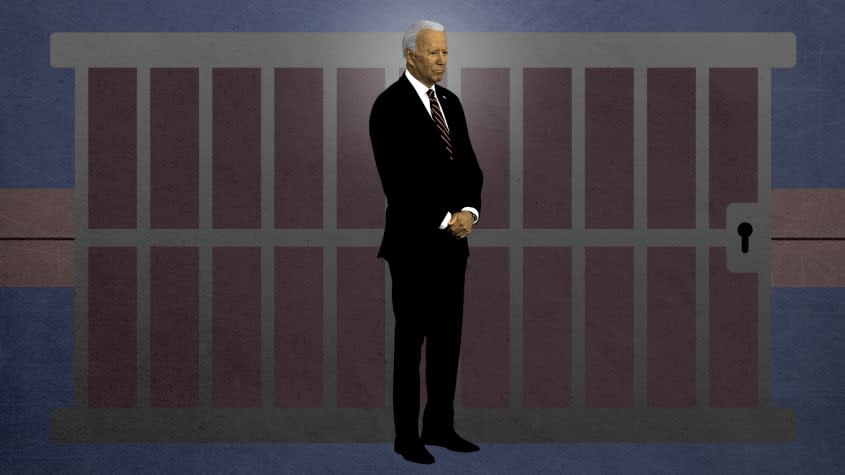This is not the major criminal justice reform Biden promised

- Oops!Something went wrong.Please try again later.
More than a year after taking office, President Biden has finally decided to use his executive powers to begin fulfilling a campaign promise: On Tuesday, he pardoned three people and commuted the sentences of 75 nonviolent drug offenders.
"America is a nation of laws and second chances, redemption, and rehabilitation," Biden said in a statement. "Elected officials on both sides of the aisle, faith leaders, civil rights advocates, and law enforcement leaders agree that our criminal justice system can and should reflect these core values that enable safer and stronger communities." His administration also announced new steps to help former prisoners reintegrate into society, including $145 million for job training and re-entry programs.
That's all good news. But why did it take so long?
Among those pardoned is Abraham Bolden Sr., the first Black Secret Service agent on a presidential detail. In 1964, Bolden, who served under President John F. Kennedy, faced federal bribery charges for allegedly attempting to sell a copy of a Secret Service file. Bolden has long maintained his innocence, even writing a book in which he argued he was targeted for speaking out against racism within the Secret Service. He said in an interview published Tuesday that he believed Biden "sympathized" with him and "saw a need to honor due process in my case."
There is a sense of relief for people like Bolden, and I know stories like his will make for nice news segments in the coming weeks and months. I will not discount how important it is for men like Bolden to gain some semblance of justice after fighting for it for so long.
Still, timing is everything. Biden's moves follow longtime calls by criminal justice activists for him to use his executive authority to help deal with the disproportionate number of Black people harmed by the criminal justice system.
The administration itself acknowledged the problem during a virtual roundtable held Tuesday afternoon with six formerly incarcerated people. "There are simply too many people serving unduly long sentences for nonviolent drug crimes, a disproportionate number of whom are Black and Brown," White House Counsel Dana Remus said at the start of the roundtable. Indeed — which makes one still wonder why Tuesday marked the first time Biden has used his pardon and commutation powers in his presidency?
Before Tuesday's announcement, this piece was going to be about why Biden hadn't pardoned anyone yet. The news changed my plans, but only a little. It's still just one relatively small round of clemency.
As a candidate, Biden promised to usher in significant changes to the criminal justice system — saying that as president he would "strengthen America's commitment to justice and reform our criminal justice system." That campaign platform included expanding presidential clemency to free inmates serving sentences for some nonviolent and drug crimes, ending the federal death penalty and solitary confinement, and decriminalizing marijuana. In many ways, his campaign criminal justice reform policy proposals sought to fix problems he'd helped create in decades past as senator.
Considering the damage done by legislation such as the 1994 Crime Bill, there's a lot to fix. Why not start as fast as possible?
Last June, more than 150 organizations sent a joint letter asking Biden to fulfill his campaign promise to end federal solitary confinement. That didn't happen, and the George Floyd bill designed to reform policing by eliminating qualified immunity for officers died a tragic death not long after the letter was sent. On the issue of marijuana specifically, Biden once said: "No one should be in jail because of marijuana. As president, I will decriminalize cannabis use and automatically expunge prior convictions." Yet last November, when the New York Post asked if he would pardon any marijuana inmates for Thanksgiving, he laughed off the question and said that it would be "just turkeys" getting a reprieve.
All these issues appear to be behind the administration, at least for now. This is not an impressive start, and it has rightfully earned scorn and criticism. Granted, Biden was busy dealing with the plague, Afghanistan, and more. And he's reportedly wary of appearing to misuse the pardon power in the style of former President Donald Trump, who used the authority to free allies like former Arizona sheriff Joe Arpaio and political operative Roger Stone.
But all that is no excuse for Biden's inaction. If anything — as evinced in the turkey remark — his administration has taken a cavalier attitude toward making good on the president's once-urgent promises around criminal justice.
Biden said on the campaign trail he would not only preserve American democracy, but transform the justice system. Tuesday marks a good turn for the administration, but by Biden's own standard, it fell severely short.
You may also like
Reports: Sweden and Finland agree to apply for NATO membership at the same time

